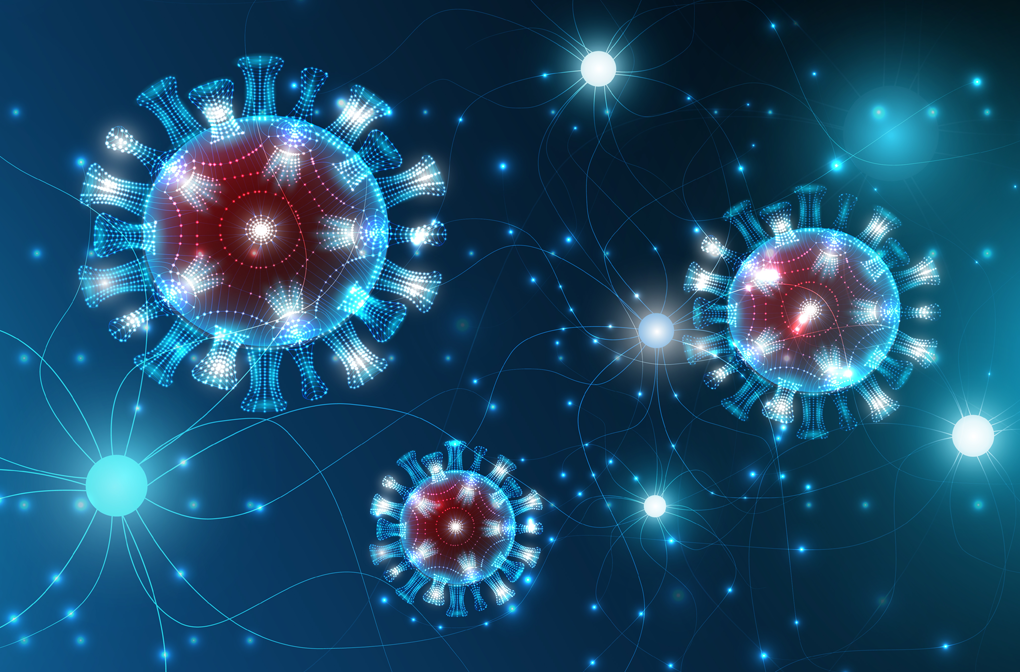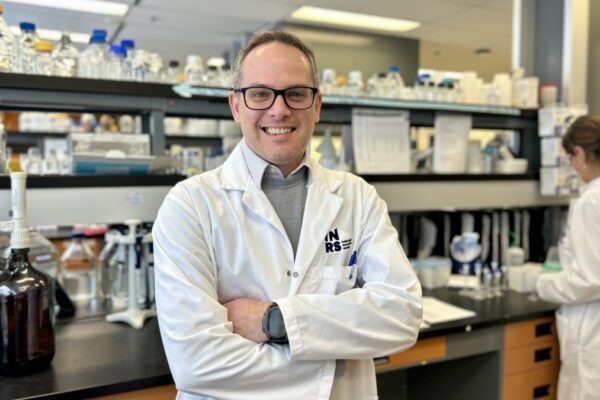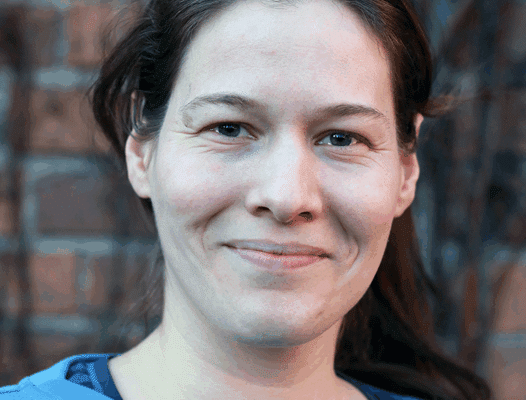- Research
The Institut national de la recherche scientifique (INRS) announced last October the creation of a program to provide internal financial support for research projects on COVID-19.

Five innovative projects were selected, focusing on the treatment, detection and rapid diagnostic tests of the virus, its impact in communities and its effects on society, as well as the associated social changes. Each project will receive $100,000 for one year in grants, with the possibility of a one-year renewal.
Treatment, detection and diagnostic tests
Combined SARS-CoV-2 treatments

Co-leads: Steven Laplante and Alain Lamarre
Objective: Find a broad-spectrum antiviral against coronaviruses. The study will test the therapeutic efficacy of a library of molecules already safe for the human body and accepted by the U.S. Food and Drug Administration (FDA), thereby accelerating the process of clinical trials and the creation of a drug or a combination therapy. Laurent Chatel-Chaix and Pierre Talbot will contribute to this project.
Neuromorphic photonics for COVID-19 detection

Co-leads: Roberto Morandotti and Tiago Falk
Objective: Develop an artificial intelligence platform for automated speech analysis. This platform has the potential to identify speech biomarkers and changes in respiratory sounds (e.g., coughing and breathing) for detecting COVID-19. The platform is modelled on brain neural networks using integrated photonic components and exploiting photons to transport information at the speed of light.
Co-candidate: Carolyn Côté-Lussier
Pandemic-related effects and social changes
CommunoSerre: Sociotechnological integration of community and solidarity greenhouses in disadvantaged urban neighbourhoods impacted by the pandemic

Co-leads: Nathan McClintock and Jasmin Raymond
Objective: Interdisciplinary evaluation of the sociotechnological integration potential of greenhouses in disadvantaged urban areas to enable year-round food production and to better prepare these neighbourhoods to face pandemic supply challenges. This work will be carried out by evaluating the technical, socio-economic and political issues impacting the success of social and circular economy projects to develop an integrated approach that facilitates the development of these projects in a more equitable and ecological manner.
Co-candidates: Sophie Van Neste, Louis-César Pasquier, and Geneviève Bordeleau
Shocked by uncertainty – the socio-economic impacts of the pandemic on life courses

Co-leads: Xavier St-Denis and María Eugenia Longo
Objective: Identify the long-term effects of pandemic-related upheaval (job loss and job insecurity, loss in household income and debt, postponement of education and life plans and their link to risk taking, lack of support and separation of couples). The study will highlight the persistence of negative and interrelated effects on life plans and social ties, especially among the most vulnerable groups, in the two years following the initial shocks observed from March to August 2020.
Co-candidates: Julie-Anne Boudreau, Nicole Gallant, and Maude Pugliese
Virus incidence profiles in communities
Perinatal and transition to parenthood during COVID-19 – from the social level to the molecular level

Co-leads: Géraldine Delbès and Laurence Charton
Objective: Document and better understand the psychosocial impact of the COVID-19 pandemic on pregnant women, new parents, and infants. More specifically, this project aims at identifying sociobiological factors associated with perinatal risks in a pandemic context. It will allow the establishment of better-targeted support policies for expectant mothers and family well-being, as well as recommendations for health professionals and (future) parents.
Co-candidates: Cathy Vaillancourt, Laurent Chatel-Chaix, Jean-Charles Grégoire, and Nong Zhu
“With this initiative, INRS provides additional financial support to its research teams and reinforces its contribution to innovative and cross-sectoral projects.”
INRS Scientific Director Pascale Champagne.
“Moreover, interdisciplinarity is one of the values of our academic institution. The selected projects clearly demonstrate this by bringing together professors from different centers or other research institutions,” said INRS Scientific Director Pascale Champagne.
Last fall, INRS’s Board of Directors and management, in accordance with the 2019-2024 Strategic Plan, decided to invest in research on COVID-19, thereby fulfilling its mission to contribute to the development of Quebec society through research and the training of highly qualified researchers. All projects had to meet INRS’s criteria for equity, diversity and inclusion, and the teams formed had to be led by two co-leads, one of whom is at the beginning of his or her career (10 years or less of experience in an academic institution). A minimum of two disciplines had to be represented.



